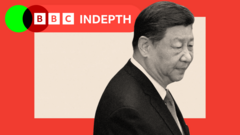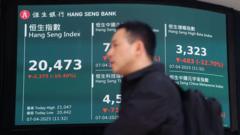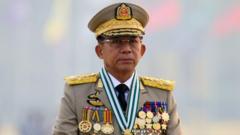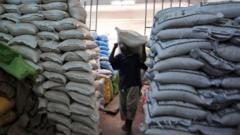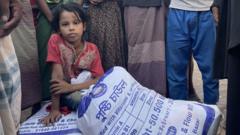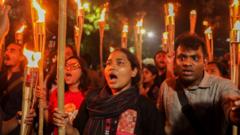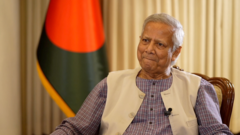**A recent announcement from Bangladesh's interim government forbids all functions of the Awami League, the former ruling party, in a bid to address violent uprisings and legal disputes involving its members.**
**Bangladesh Revokes Activities of Awami League Amid Uproar**

**Bangladesh Revokes Activities of Awami League Amid Uproar**
**Interim Government Moves to Ban Party Following Violent Protests Linked to Former Leader Sheikh Hasina.**
The interim government of Bangladesh made headlines on Saturday as it declared a ban on all activities of the Awami League, the political faction led by ousted Prime Minister Sheikh Hasina. This decision falls under the country's antiterrorism legislation, implemented until legal proceedings against the party and its leaders reach a conclusion.
Nobel laureate Muhammad Yunus heads the interim government, which has taken steps to amend laws governing political party accountability. The new regulations allow an entire political party to face trial for specific crimes, rather than solely individual members. This move comes in the aftermath of Hasina's departure to India amid mass protests that toppled her regime last summer.
Tensions have intensified since Hasnat Abdullah, a prominent figure in the previous protests, was recently attacked, leading supporters to direct blame at the Awami League. This incident has fueled demands for stricter measures against the party. “Our ultimate goal is to see that the Awami League is banned,” Hasnat declared at a Saturday rally, which saw hundreds of demonstrators, including injured students from prior protests.
Law Minister Asif Nazrul confirmed that the ban is in effect under the Anti-Terrorism Act pending the completion of trials concerning the Awami League at the International Crimes Tribunal. The hearing follows allegations that members of the party committed human rights abuses during last year’s protests. Notably, a government inquiry suggested that Hasina was responsible for orchestrating mass disappearances during her tenure, while a UN fact-finding mission reported over 1,400 fatalities among protesters, including children.
Despite the serious allegations, the Awami League responded via social media, labeling the actions of the interim government as illegitimate due to its unelected status. The protests, originally ignited by grievances regarding a job reservation system, morphed into widespread dissent over Hasina's leadership. Escalating violence forced Hasina to flee her residence on August 5, 2024, shortly before Yunus assumed control of the government.
Nobel laureate Muhammad Yunus heads the interim government, which has taken steps to amend laws governing political party accountability. The new regulations allow an entire political party to face trial for specific crimes, rather than solely individual members. This move comes in the aftermath of Hasina's departure to India amid mass protests that toppled her regime last summer.
Tensions have intensified since Hasnat Abdullah, a prominent figure in the previous protests, was recently attacked, leading supporters to direct blame at the Awami League. This incident has fueled demands for stricter measures against the party. “Our ultimate goal is to see that the Awami League is banned,” Hasnat declared at a Saturday rally, which saw hundreds of demonstrators, including injured students from prior protests.
Law Minister Asif Nazrul confirmed that the ban is in effect under the Anti-Terrorism Act pending the completion of trials concerning the Awami League at the International Crimes Tribunal. The hearing follows allegations that members of the party committed human rights abuses during last year’s protests. Notably, a government inquiry suggested that Hasina was responsible for orchestrating mass disappearances during her tenure, while a UN fact-finding mission reported over 1,400 fatalities among protesters, including children.
Despite the serious allegations, the Awami League responded via social media, labeling the actions of the interim government as illegitimate due to its unelected status. The protests, originally ignited by grievances regarding a job reservation system, morphed into widespread dissent over Hasina's leadership. Escalating violence forced Hasina to flee her residence on August 5, 2024, shortly before Yunus assumed control of the government.


